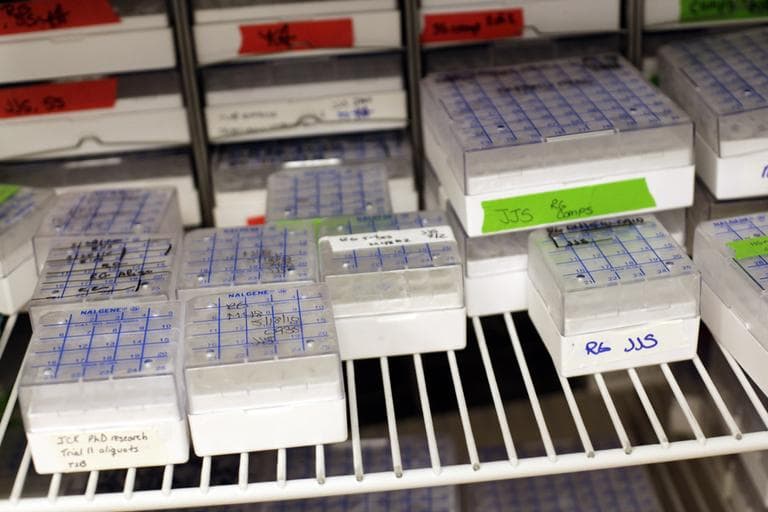Advertisement
Law Enforcement Still Holds DNA From Worthington Case
Resume
When Keith Amato agreed to give a DNA sample to Cape Cod law enforcement officers in connection with the 2002 murder of Christa Worthington, he expected that they would destroy it after he was cleared of any criminal involvement. Instead, he learned that the Massachusetts state crime lab keeps DNA evidence for 50 years as a matter of policy.
Amato sued, alleging state officials violated his right to privacy by keeping his DNA. The lawsuit was dismissed by a lower court judge. But this month, the Massachusetts Appeals Court reversed that ruling and reinstated the lawsuit.
"The allegations that the defendants have retained Amato's highly sensitive DNA records without his consent and made them available for nonconsensual use in other criminal investigations are sufficient to constitute an unreasonable, substantial, and serious interference with Amato's privacy," the court said in its ruling.
Christopher McCowan, Worthington's trash collector, was convicted of her murder in 2006. He is serving a life sentence.
Amato claims in his lawsuit that in 2002 state police detective asked him for a DNA sample early in the course of their investigation.
"He said, 'Keith, we'd like a sample of your DNA in order to rule out the possibility that you were involved with this in any way,'" Amato said.
Amato has a distant family connection to Worthington. He agreed to give the officer a sample of his DNA, but on one critical condition. "Once I'm ruled out," he said, "I want it destroyed or given back to me, in whole, the whole thing. So yes, I made it very clear to him. And he absolutely assured me that that would happen, which was a blatant lie, obviously."
Cape and Islands District Attorney Michael O'Keefe disputes that, saying no such promise was made to Amato.
Police ultimately ruled Amato out as a suspect, and Amato asked the state crime lab to return his DNA sample. They wouldn't, so he sued. An assistant attorney general handling the case for the state arranged to have his original cheek swab returned.
"But they retained the profile, the information that was generated from the swab," said Mark Batten, the lawyer representing Amato on behalf of the Massachusetts ACLU.
A DNA profile is a series of black and gray blobs that resemble a bar code. It's essentially Amato's DNA fingerprint, and it's still on file with state law enforcement.
"So, Keith feels that the information contained in his DNA profile, the most specific identifier of an individual that you can have, is loose in a government file that could be used for any purpose, without his knowledge, without any kind of judicial oversight, without any kind of restriction," Batten said.
O'Keefe, who is named a defendant in the case, believes there's good reason to retain DNA profiles.
"Say for example the case was overturned on appeal and there was a new trial, wouldn't one want the evidence that exonerated them...wouldn't one want that evidence to be retained in the case files," he said.
O'Keefe also told the Associated Press that once McCowen was convicted, he issued a press release telling men who gave samples as part of the DNA sweep that they had a certain amount of time to either pick up their samples or have them mailed to them, and after that, they would be destroyed.
"Many people did that," he said. "Those samples were returned or destroyed years ago."
Samples from people who knew Worthington, however, have been retained under the standard protocols, O'Keefe said.
Here's where it gets complicated. There are strict privacy regulations when it comes to genetic samples collected by the FBI. In Massachusetts, there's also a Commonwealth statute that says the state cannot collect or maintain more personal data than is reasonably necessary for an agency to carry out its function. That's the basis on which Amato and the ACLU have filed their lawsuit.
And, it turns out the state crime lab does have an established protocol for how long it retains evidence. It's called a retention schedule, which states that in some cases, evidence must be retained by the state for 50 years. But, it's not a statute, or a regulation, or an executive order that's been through any kind of judicial or legislative oversight.
"So really, Mr. O'Keefe saying he has the right to hold on to my DNA for the next 50 years really is just an abuse of power," Amato said.
His opinion was not shared by a judge in Suffolk Superior Court, who dismissed his case. Amato appealed. And last week, the Massachusetts Appeals Court overturned the lower court and ruled that his lawsuit can go forward.
"DNA information is highly sensitive," Judge David Mills wrote, "Citizens have a reasonable expectation of privacy in such information... We are not convinced that [O'Keefe and the State Police] have acted reasonably as a matter of law."
Mark Batten, Amato's lawyer, said he'll press for clarification of law enforcement practices as the case moves forward. "The [appeals court] is saying, if you're going to retain this information, you have to tell us why," Batten said. "Now, it may be that they may be able to justify hanging on to Keith's DNA for some period of time, but so far they haven't been even willing to tell us why they need it."
We turn to local experts to find out what is at stake when law enforcement holds on to DNA long after a case is closed.
Guests:
- David Lazer, associate professor of Political Science and Computer Science, Northeastern University; director, Networked Governance, Harvard Kennedy School
- Carol Rose, executive director, ACLU of Massachusetts
This segment aired on August 30, 2011.